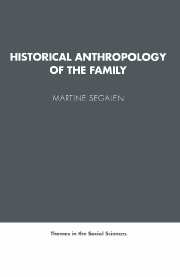4 - THE HISTORICAL SOCIOLOGY OF MARRIAGE
Published online by Cambridge University Press: 14 January 2010
Summary
The institution of marriage, on which the family is based, is becoming better understood as a result of recent historical, demographic and anthropological research. To some extent, the methods and approaches to problems used by these disciplines have converged, providing fresh data in this area. Over a time-span stretching from the sixteenth century to our own age, we are in a position to reply to a certain number of questions capable of casting light on the meaning of the family as an institution. These questions are related to the choice of marriage partners, the age at which marriage takes place and its functions.
By studying the way in which the conjugal couple is made up, we can also understand changes that have occurred in the family and that are linked to modifications arising from industrialisation and urbanisation. Such relationships, however, as we have already seen with kinship, are never simple or linear. If we are to perceive certain mechanisms of change, we must study times, places and social milieux in detail.
Right from the start, we must reject the general misconception that nowadays we marry for love, whereas in the past people married for pecuniary or other advantages, and that now we choose a spouse ourselves, whereas in the past marriages were arranged by parents. Stereotypes of this kind are linked with the supposed development of the domestic group.
- Type
- Chapter
- Information
- Historical Anthropology of the Family , pp. 107 - 138Publisher: Cambridge University PressPrint publication year: 1986



